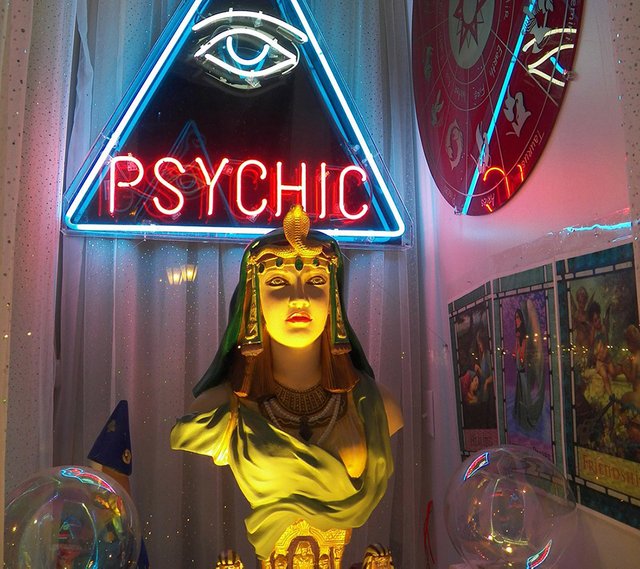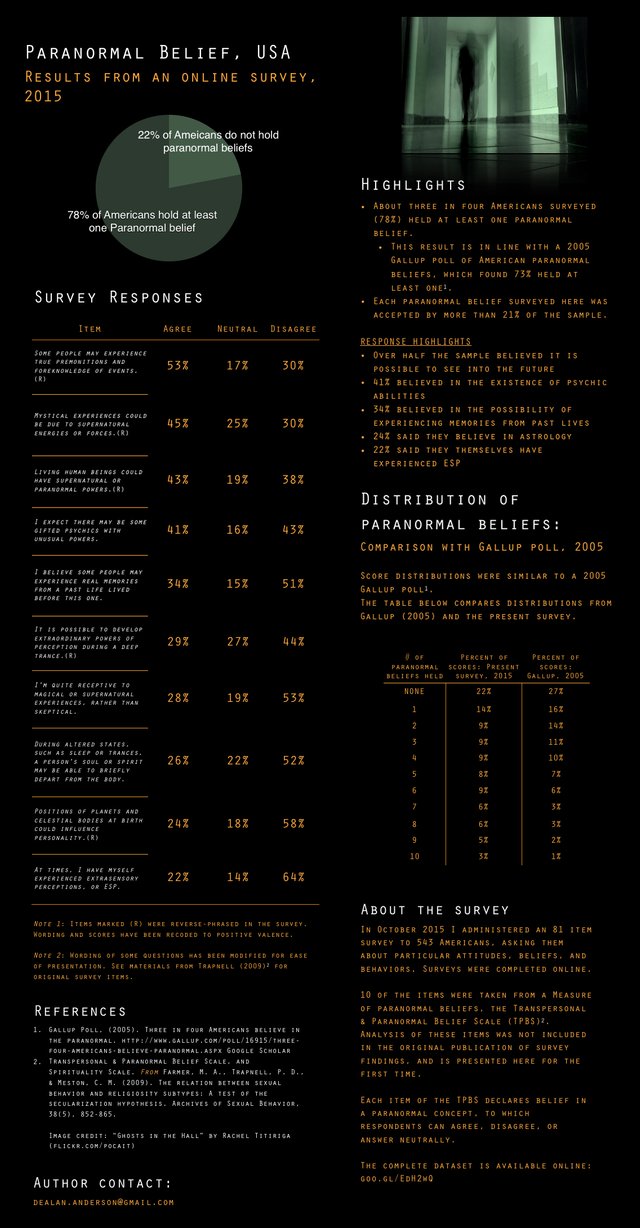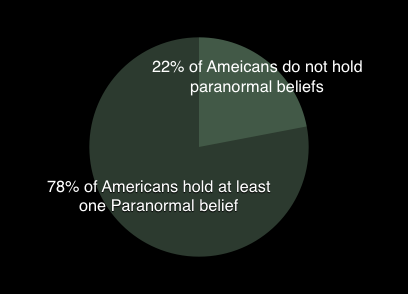Do You Believe in the Paranormal? Answers from 500+ Americans

Image: "Psychic" by Junior Libby
Hello, in October 2015 I administered an 81 item survey to 543 Americans, asking them about their particular attitudes, beliefs, and behaviors. Analysis of ten survey items was omitted from the original research publications, and is presented here for the first time.
These ten items are derived from Dr. Paul Trapnell's Transpersonal & Paranormal Belief Scale (Trapnell, 2009). Each asks respondents if they hold paranormal beliefs by declaring belief in a paranormal concept, and then asking the respondent if they agree, disagree, or feel neutrally about it.
Surveys were completed online using Mechanical Turk and Qualtrics. The full dataset is available for download: goo.gl/EdH2wQ
Infographic

Highlights

- About three in four Americans surveyed (78%) held at least one paranormal belief. This result is in line with a 2005 Gallup poll of American paranormal beliefs, which found 73% held at least one.
- Each paranormal belief surveyed here was accepted by more than 21% of the sample.
- Over half the sample believed it is possible to see into the future
- 41% believed in the existence of psychic abilities
- 34% believed in the possibility of experiencing memories from past lives
- 22% said they themselves have experienced ESP
- 24% said they believe in astrology
The paranormal is no question of believe. Isn't it just existing like the normal. It is the whole world outside the range of our senses.
Hi, thank you for sharing your perspective. Fyi, the idea was to see what people do believe, regardless of what paranormal phenomena may or may not be. Thank you again.
This is fantastic. Although I am very skeptical I find the subject fascinating.
Are you on Twitter by any chance?
https://twitter.com/Soul_Eater_43/status/836575609035886593
#research
Disclaimer: I am just a bot trying to be helpful.
Hi, no I'm not on twitter. I really appreciate you promoting this post.
By the way, I have similar infographics in the works (that use the same data) for American spirituality, belief in conspiracies, and attitudes toward vaccination. Stay tuned!
Am I the only one severely depressed by this...?
Hi, depressing or not, this is a gigantic feature in the landscape of American belief. It receives surprisingly little attention in popular conversation.
I think most people view it as offensive if you tell them their beliefs aren't true.
Well, I'm not telling anyone that. This info is here for anyone to use for any purpose. My goal is to see what's happening, big picture. I appreciate your taking the time to respond.
You're welcome.
It was a nice post.
I believe too :v
Fuck yeah.
I hate these kinds of surveys. They mean belief as in you have strange thought that the rest of us don't have.
Most of the paranormal is experiential.
You do not believe in it, you experience it.
Say, an alien came down to earth and asked an earthling, to describe love. They have never experienced love, and think that all humans are insane for believing in this mystical force. But this alien is sceptical, and is open to listening to explanations. Could you describe love? Could you show the alien proof of love?
Would you be perturbed when the alien congregation told you that you are insane for such insane beliefs?
Chi is considered in the west to be woo-woo. Chi in the east is considered part of everything you interact with. So, you ask a chi practitioner, do you "believe" in chi. Its like asking an artist, do you believe in paint?
When you have memories of past life experiences, it is not a belief. That is the term used to describe these kinds of memories. To say they don't exist is to deny someone their experience. (you didn't have that experience!) There are piles and piles of anecdotal evidence showing that these memories are true and real.
The questions of this poll show that the question writers don't know much about the paranormal. Many of these questions I would have to answer false because the question itself is false. These questions are as bad as:
When playing baseball, how many goals do you usually get per quarter?
Thank you for sharing your thoughts on this. My interest is not the factuality of paranormal phenomena, but what people believe about it. Social researchers want to know how we live with our beliefs, in spite of their epistemic warrant, and that's where I'm coming from. Thanks again.
I think there's real value in the "wisdom of the crowd" and also, and this isn't unrelated, shared intuition. If, for instance, 99.9% of people were to believe that something is true without any real, tangible, proof, we certainly can't rule out at that point that it's not purely circumstantial.
Prediction markets have value to us because they've demonstrated time and time again to have real predictive power and statistical reliability -- this is testament to wisdom of the crowd. Now, I admit that predicting psychological behavior (such as the price of a stock) is very different from measuring the probability of something being real based on the number of people that believe it to be so, but, at the same time, we can't rule out the possibility that the same wisdom that leads to statistically significant predictive powers of human events may also be the same that leads to the number of people that agree on unproven (scientifically unsubstantiated) views of reality.
One potential explanation for this (hypothetical) "reality approximation" by random survey is Carl Jung's concept of a shared human unconsciousness. It would make sense in nature that random individuals would have poor approximations of what is true about the nature of reality, due to the variance inherent in multiplicity (individuality), but that the whole, taken together, would better approximate reality. In other words, the "collective unconscious", each individual being given the same "voting power" (voice), could, in theory, result in an average view that cancels out severely deluded concepts of reality, leaving us with a concept that very closely approximates the true nature of the thing/ situation in question.
How is it possible that human consciousness could be such a reliable barometer of reality? Well, our brains and bodies are made up of matter, the matter of atoms, within which there are variances of energetic properties, but, on the whole, all "tend" to a specific set of properties, which make up the "laws" that we observe in the "knowable" universe. Why wouldn't our brain and bodies, made up of these constituents, share that same tendency? Individually, our unconscious and conscious minds could be deluded due to the inherent variance of chemical compositions, due to variance of energetic properties inherent in the matter that makes up the brain and body, due to variance inherent in the forces playing at the atomic level (electromagnetism, strong/ weak nuclear force, gravitational force); however, like the individual elements (gold, iron, helium, carbon, nitrogen, etc.) have their factual properties when seen at the "large scale" of our physical observation, yet have their slight energetic variances at the smallest measurable scales, human consciousness may have a 100% dependable approximation of "truth", regarding the nature of reality, when taken at the scale of all humanity, although there is a known variance at the scale of individuals and "tribes".
The idea here is: so above as below. Of course, it could turn out to be wrong, but it's worth investigating.
Yeah, I'm learning over and over in my travels that Jung is
the most influential philosopher of our time. How we talk about truth in our day, both casually and academically, is totally influenced by Jung's writings, whether we know it or not!. Thank you for your input!
We do not live in an objective reality, we live in an experiential reality.
Yes, there is a collective unconscious, however, it is not how you envision it.
Everything is connected. Everything.
So, Schroedinger's experiment with the cat, well everyone knows if the cat is alive or dead, and the odds have to do with all the people involved and the cat. Probability plays no role.
Here are some similar metaphors
How do you explain color to a blind man? There isn't anything in the blind man's experiences to relate your experience to. (Is it appropriate for the blind man to ask, "do you believe in color?")
On this note, there are people being born now who have 4 types of receptors in their eyes. So, they can see more colors. You know that space between a double rainbow? Well that space is all filled with color. (Is it appropriate to say to these people, "do you believe in the neon colors of the rainbow?")
Go back a couple hundred years and tell people of the tiny organisms that make people sick. And they would either believe you and say, yes, I believe in tiny demons, or they would burn you at the stake. Today, we know very well of viruses.
There are three sets of push-pull forces. The strong and weak nuclear force. The strong and weak electrical force. And the strong and weak galactic force.
The world of metaphysics is huge and deep. There are all kinds of things to experience there. I wish you joy on your journey.
Again, I'm deeply appreciative of you taking your time to express your thoughts here. People's spiritual experiences and beliefs in daily life are what I'm most interested in as a student, so I'm always interested in listening. I am a student of meditation, also, and have had my own mystical moments, certainly. Thanks again!
Also, I thought I would not need to point out: it is nonbelievers who are in the minority, so they're the weirdos, statistically. That's what the survey shows!